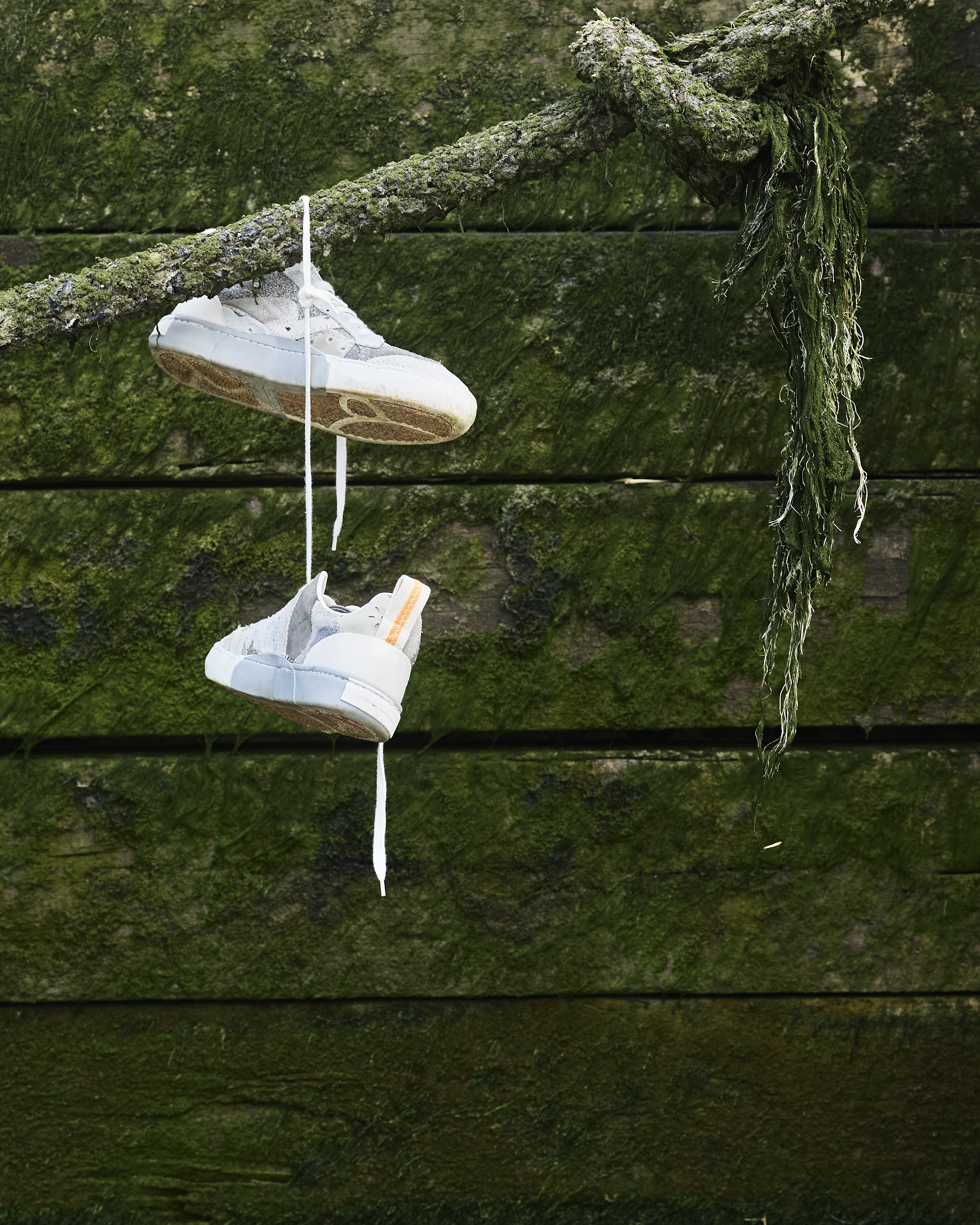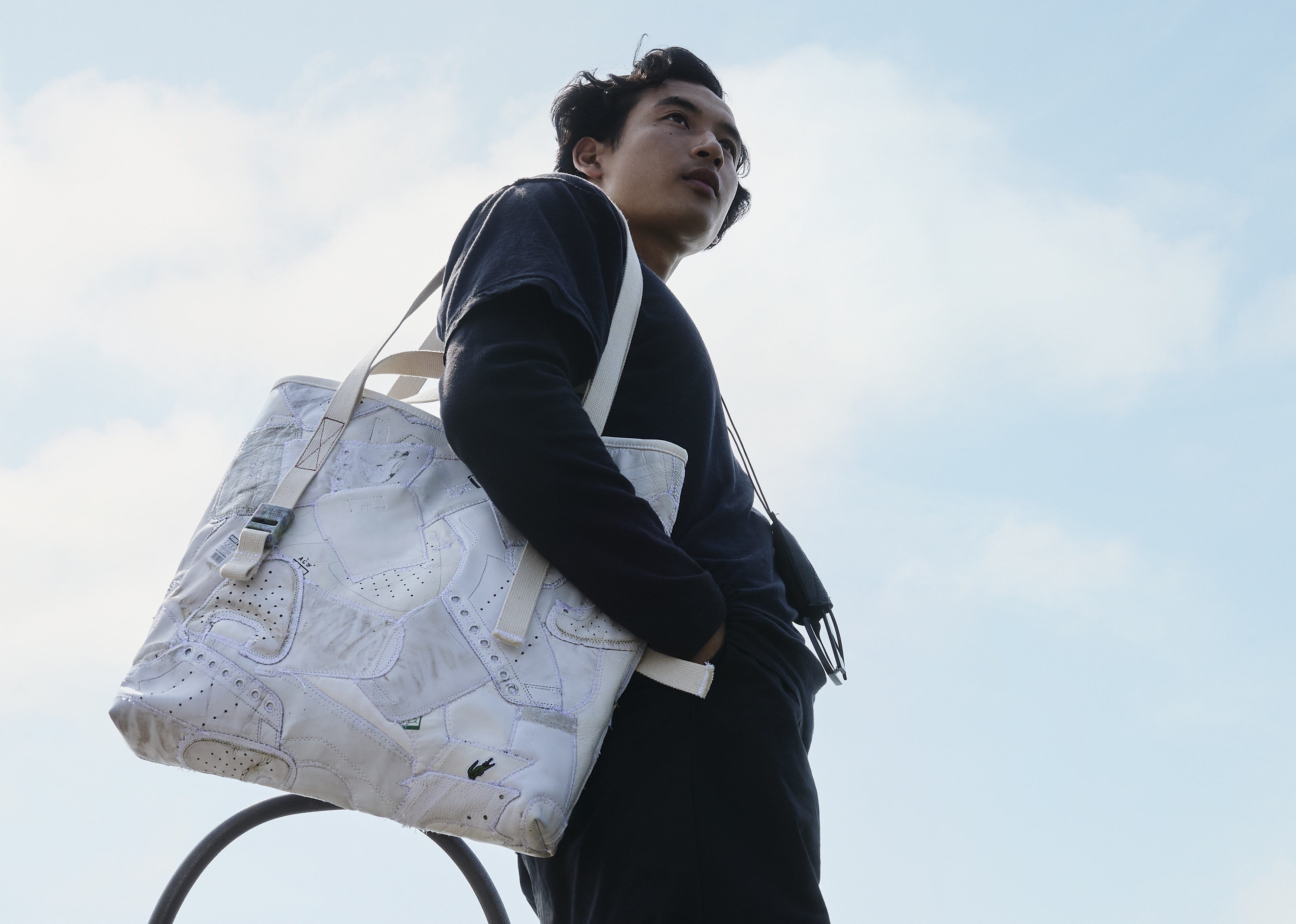Text by Brian James, Photos by Ryan Blackwell
While a number of designers use deadstock fabrics and materials to create new garments, discarded sneakers are an item many would assume aren’t capable of being revived or reinvented. Helen Kirkum is a designer who has made that unlikely proposition a reality. Deconstructing abandoned sneakers and reconstructing them into new , vibrant iterations of their former selves, Helen Kirkum has built a brand that not only gifts us beautifully crafted sneakers but also leads the way in showing how a staple of everyone’s wardrobe doesn’t need to be lost to landfill once it’s original life has ended.
Initially treading carefully to concentrate in the bespoke, custom-made footwear space, the designer has now upscaled to limited production runs and diversified into using upcycled sneaker wastage to make crossbody bags. It’s a design formula that’s underpinned by an environmental empathy and educational ethos which has seen Helen Kirkum collaborate with sneaker industry heavyweights such as Adidas and New balance. Sharing her innately sustainable values and vision with them, she has also learned from their wealth of knowledge and industry experience.
Demonstrating a blueprint for doing things differently with a product that’s not previously been part of the sustainability conversation, Helen Kirkum’s sneaker sensibility and ethical ethos has seen her recognised by her peers in the British fashion industry. A recognition that’s manifested itself through her richly deserved nomination in the Accessories Designer category of the 2024 Fashion Awards.
Flanelle spoke to Helen ahead of the Awards ceremony to ask about the creative and production processes that give new life to old shoes, what motivated her to start the brand and her thoughts on how we can effect positive change on our disposable consumer culture.
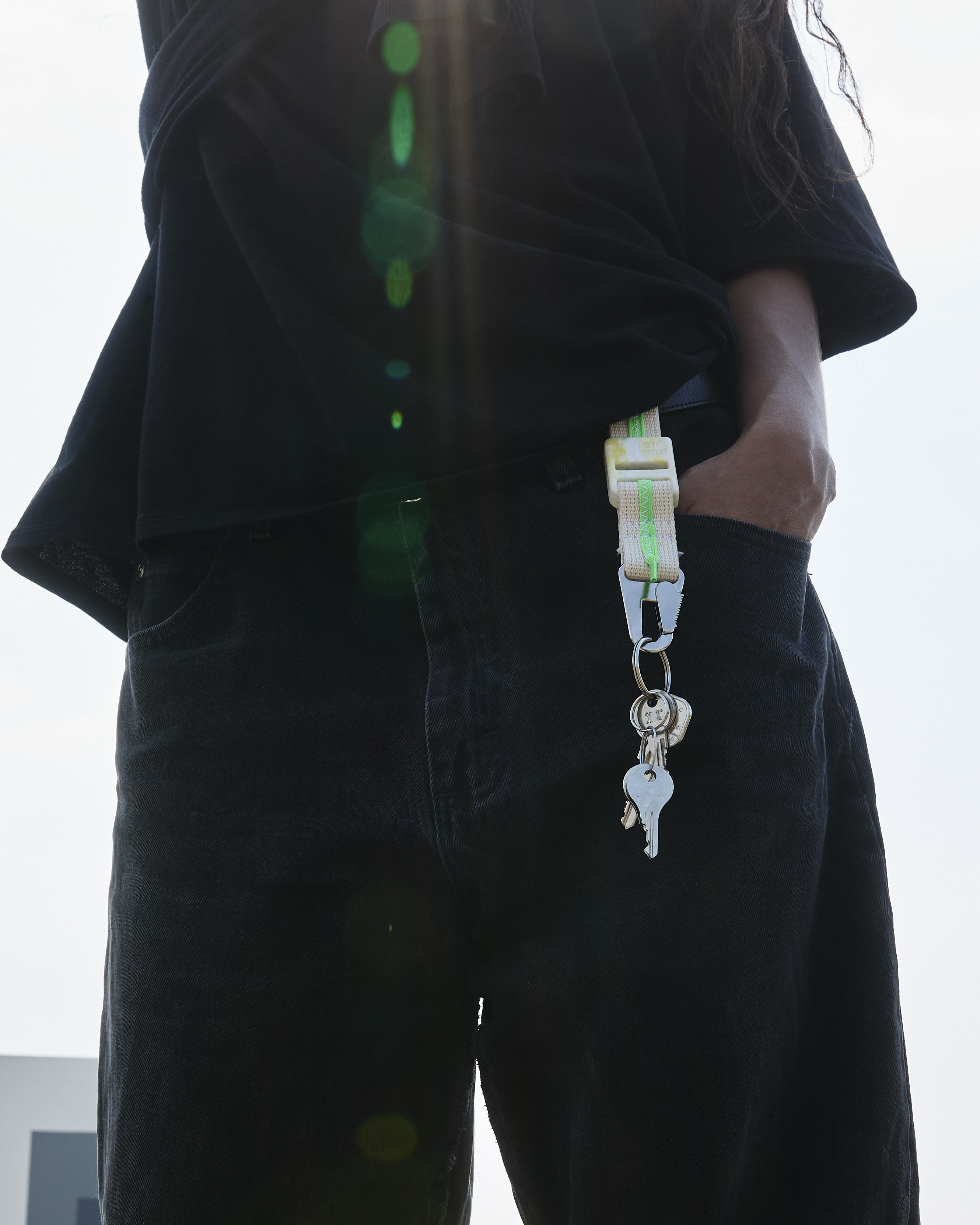
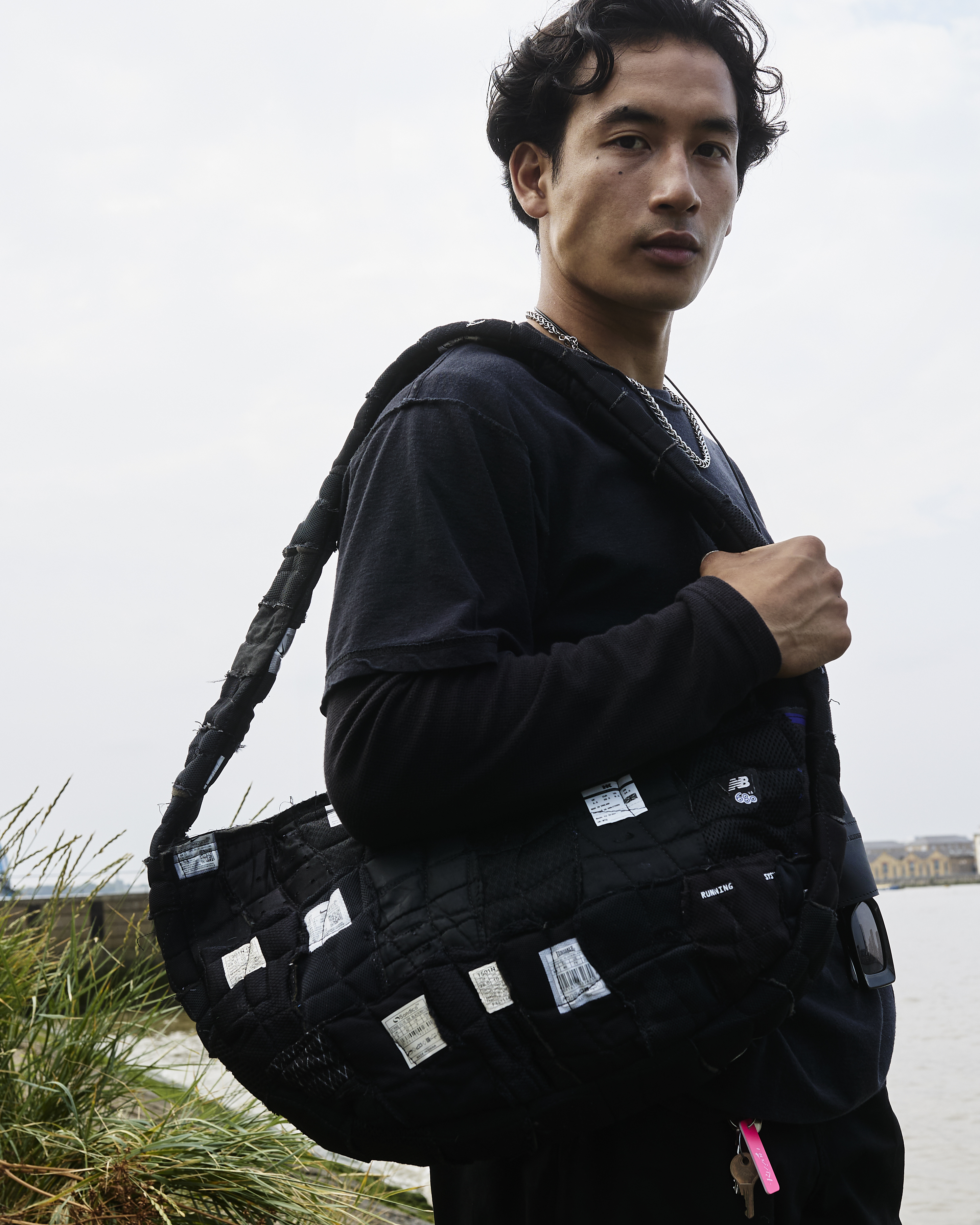
You founded the Helen Kirkum Studio in 2019. Can you tell us about your background in fashion and the arts before then?
Absolutely. I studied my BA at The University of Northampton, focusing on traditional footwear in the home of british shoe design and then moved on to the Royal College of Art, where I explored abstracting footwear and pushing the boundaries of what it could be. I worked at Adidas Originals as a footwear designer for womenswear and consulted for brands like Byredo and Yeezy before starting my own label.
What was the catalyst that led you to start your sneaker brand?
It really came down to wanting to change the way we look at footwear. At RCA I started working with Traid (clothing charity) to upcycle and rescue single sneakers that they couldn’t sell in their shops and I saw the scale of the issue we have in the UK with clothes and footwear reuse and recycling. Sneakers are such a big part of our cultural identity but are often overproduced and quickly discarded. So the mission was to create unique pieces that feel handcrafted and human, yet are wearable and responsible.
For those who may be new to the brand, can you explain its values and vision?
Helen Kirkum Studio is about inspiring others to live creatively and consciously, championing more planet friendly processes, and crafting pieces that can become catalysts for wider conversation. Through our products we want to tell the story of the waste footwear materials we collect, reimagining them as precious textiles that are full of history.
Where do you source the discarded sneakers you upcycle, and what deadstock materials do you use?
We’ve built relationships with various recycling facilities such as Traid and Salvation Army who support us with unsellable or discarded sneakers that we can collect, clean and deconstruct ready to transform into our collaged sneaker materials. We also work with a network of brands and businesses with similar missions and collect some of their deadstock that we can use for things like our bag linings and shoe bags.
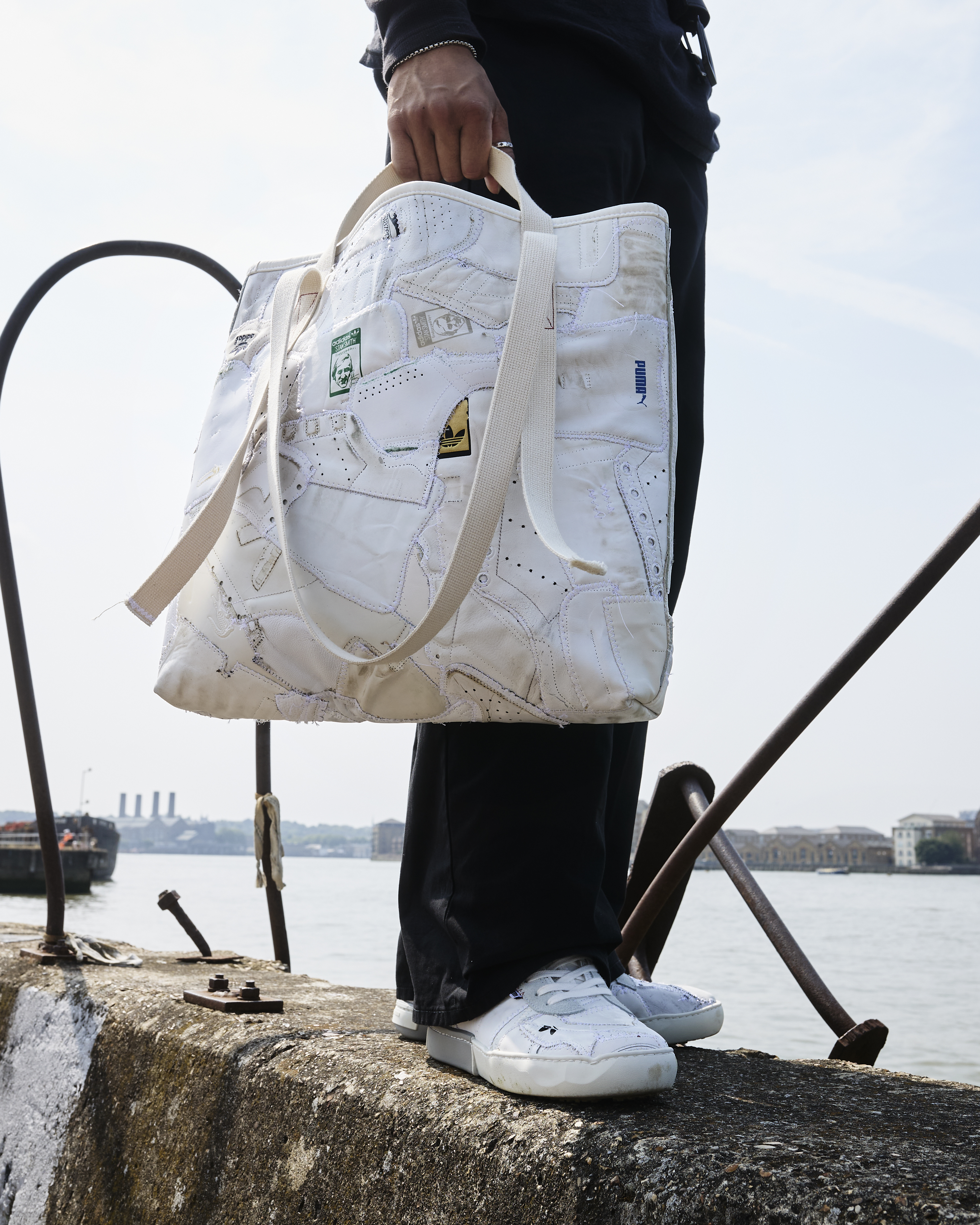
Can you tell us about the technical and creative processes that transform them into new footwear?
Sure, the way we piece together our ‘collaged sneaker material’ I guess is our secret sauce. It has a flow to the material that our team has developed over the years. This is what ensures our material is harmonious rather than feeling like an aggressive patchwork. We also categorise all the components we collect into size, colour and material, this allows us to build a tonal and subtle colour story in each of our pieces. We also constantly analyse our processes to see what else we can make from the waste, for example we have just released our Crossbody bags made from upcycled sneaker tongues. The mesh materials are often backed with foams and work really well to create a spongy and squishy quilted material.
We understand that you’ve upscaled your production from bespoke to small production runs. What was the motivation behind this, and have you had to make any changes to your processes to accommodate that change?
Yes, we do still create bespoke sneakers for individual clients. Bespoke is still the lifeblood of what we do, it’s where we can experiment and play with new ideas. But I wanted to challenge the notion that ‘upcycling’ cannot scale, and especially challenge the sneaker industry to see if such a radical idea could be accepted. We had to invent a whole series of processes to go on this journey and that’s where our ‘collaged sneaker leather’ came from. Our signature Palimpsest Sneaker embodies all of this, allowing us to reach more people without sacrificing that handmade quality and uniqueness you feel with bespoke.
Congratulations on being nominated in the Accessories Designer category of the 2024 Fashion Awards. How did you find out about the nomination, and how rewarding is it to have your work recognised in this way by your British fashion industry peers?
Thank you so much! It was a bit surreal getting the email! But it feels amazing to have this recognition, especially as an upcycling-focused brand in such a fast-paced industry driven by newness. It’s validating and gives us momentum to keep going and pushing the boundaries of what a sneaker brand can look like in 2024.
Over 300 million pairs of sneakers are thrown away each year, so how would you like your nomination to spread awareness and spark a conversation around that wastage?
I know! It’s definitely a big issue that isn’t going away anytime soon! I’d love for people to see that we don’t have to settle for wasteful practices in fashion and there is another way to think about the materiality of the things we own and wear. There is another way for products to exist, and for us to enjoy fashion that doesn’t have to be driven by the convenience of virgin materials. Sneakers can have multiple lives, and those lives can be nuanced and layered and beautiful.
That sneaker wastage is part of a disposable consumer culture that seems hardwired into our societal DNA. What do you think needs to happen to engender a cultural shift?
For me it’s all about inspiring others that repurposed, recycled or upcycled materials aren’t a compromise to aesthetic, style and identity. They can actually be something to celebrate, that aligns with and recognises your values. I also think emphasising the work, hands and processes behind the making of products can help us to feel connected to the materiality of what they are and not take them for granted. The more we understand how things are made and by who, the more human they seem and we begin to appreciate and care for them.
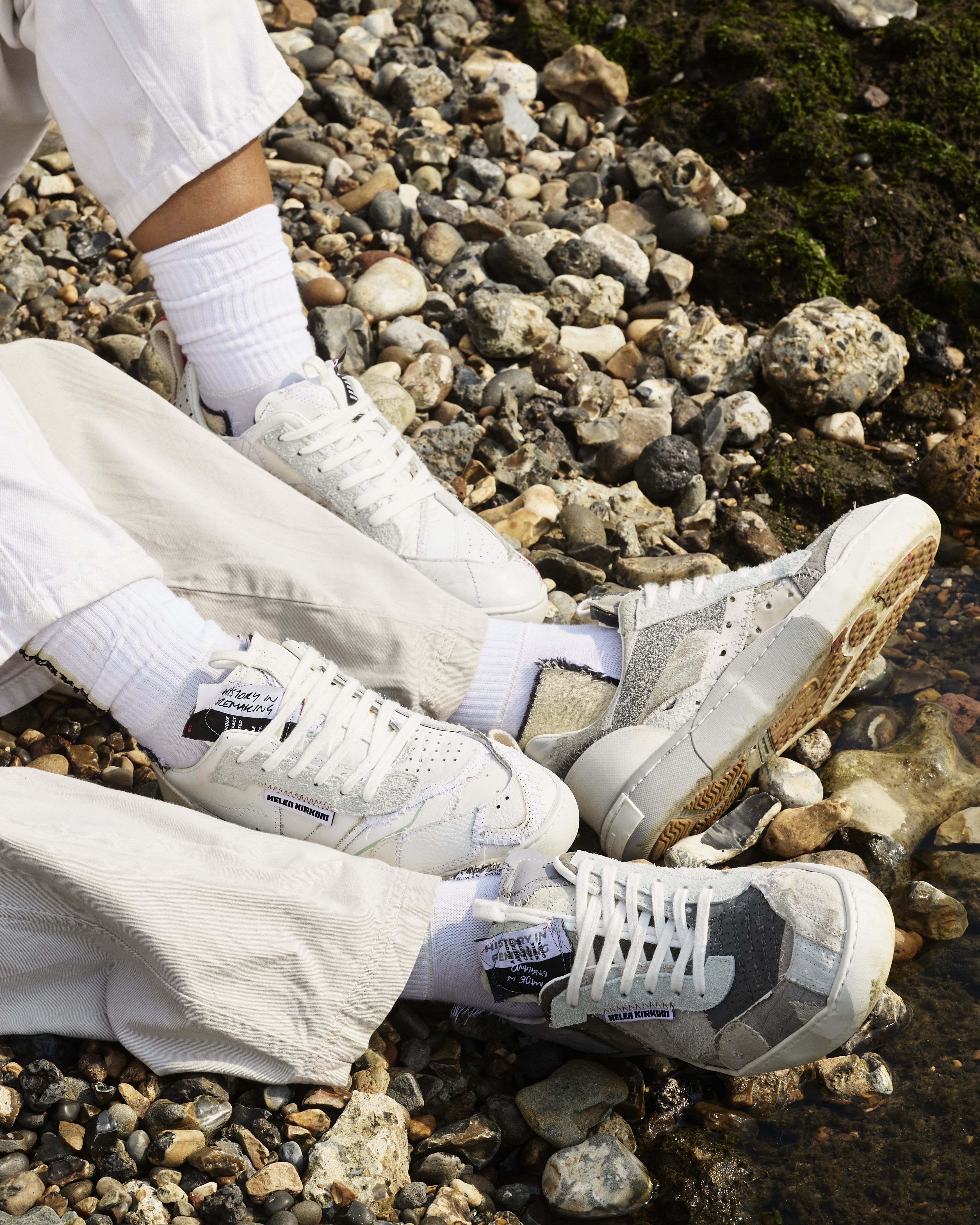
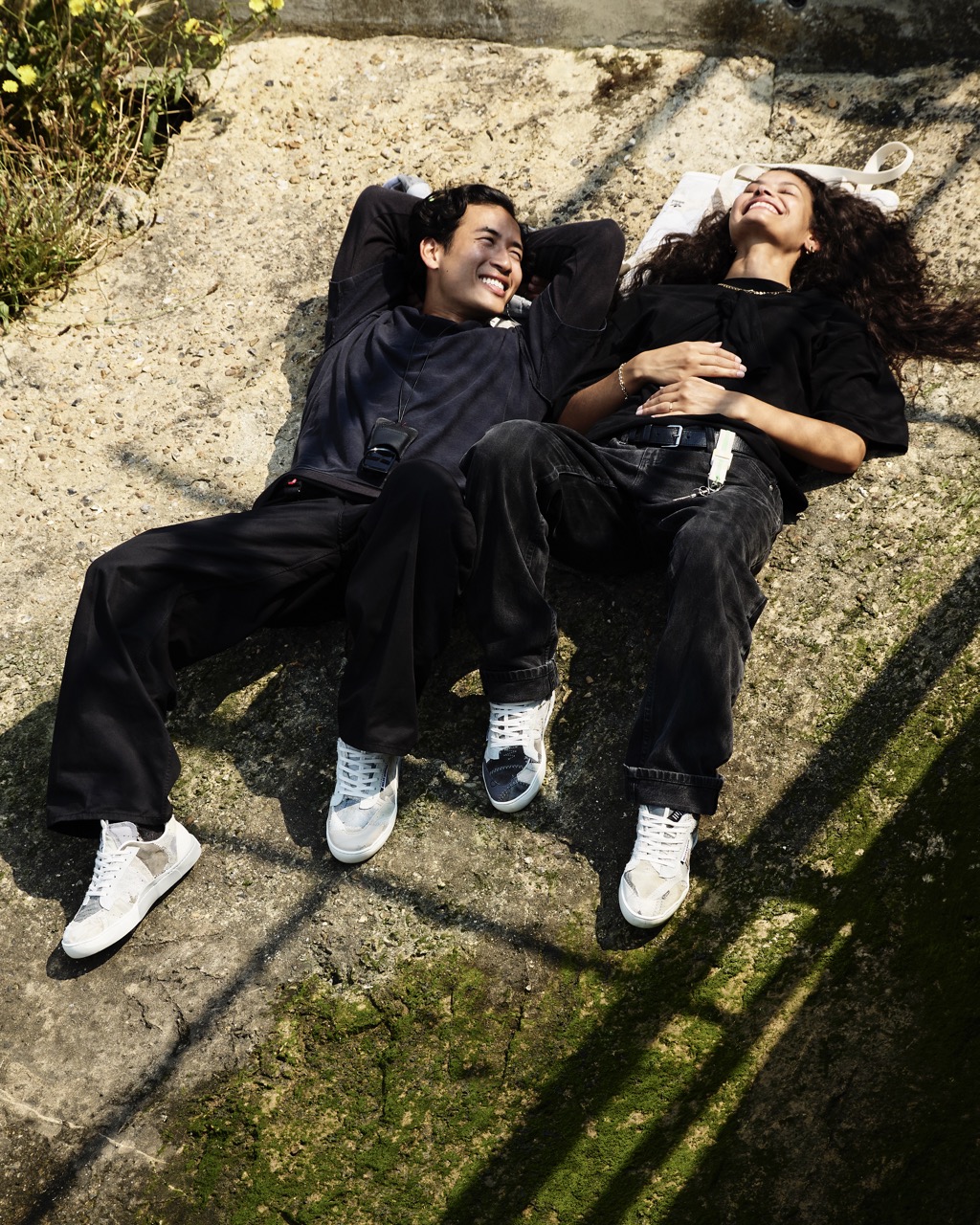
Are there any challenges in following your ethical approach and also being commercially viable, and how do you navigate them?
Balancing both can be tricky, but it’s also what keeps us motivated. We have had to do a lot of work on what our main focuses are so that we can make sure, post consumer, end of life components make up our primary textile even as we expand into working with more deadstock materials. Whenever we make anything we always analyse it with a simple question ‘what’s the point?’ To make sure we are not just creating for the sake of seasonality or newness but that any new product is considered and valuable. We’ve found that by keeping the lines of communication open with our community and honestly relaying our findings, it helps us to grow authentically without sacrificing our values.
We often see you showing at London Fashion Week. How important is that platform to the brand’s commercial growth and in spreading your ethical message?
It’s been huge for us. London Fashion Week lets us showcase our message to a global audience. We like to push the way in which we can use the platform to highlight key elements of our practice and processes. It can feel like a lot of pressure to adhere to a traditional seasonal approach but it also an opportunity to showcase there is another way.
You’ve collaborated with global footwear brands Adidas, Birkenstock, and New Balance. What benefits do these collaborations bring you, and how would you like your ethos to influence them?
Collaborations are a chance to blend our values with iconic brands and reach broader audiences with our ethos and ideas. It’s about taking our craftsmanship, our use of upcycled materials, and our narrative into new spaces and seeing how we can learn from the rich heritage, knowledge and experience of these brands to develop our practice. It’s always my hope that the brands we work with will take away some of our perspective and apply it in their own ways.
As we head towards the end of 2024, what plans and aspirations do you have for 2025?
2025 is going to be an exciting year! We have a big shift coming in the HELEN KIRKUM world expanding into some new product categories throughout the year, where we will continue to push our upcycled material offerings in unexpected and thought-provoking ways.
Helen Kirkum has implemented a transformative approach to sneaker creation. One which marries a commitment to full-circle circularity with artisanal excellence and the most covetable colourways to bring us a unique, ethically made alternative to mass-market footwear.
Her innovative and imaginative response to the over-consumption and wastage that continues to define both the footwear and the wider fashion industry couldn’t come at a more prescient time. With over 300 million pairs of sneakers being thrown away each year and each pair taking between 25 to 40 years to decompose, the environmental consequences of this sneaker addiction are there for all to see. Helen Kirkum has seen those consequences and is rewriting the narrative with exciting and exceptional sneakers , and an array of beautiful bags , all of which are imbued with environmentally aware intentionality. We hope others follow in her footsteps.
You can connect with Helen here https://www.helenkirkum.com/ and on Instagram
